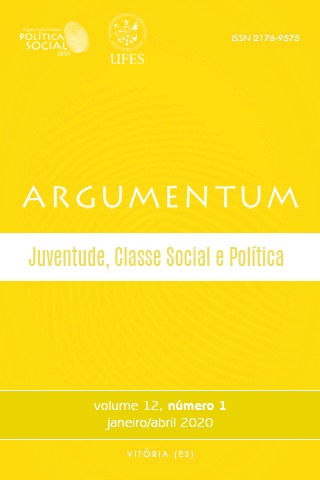The integral protection doctrine in contrast to abandonment actions
DOI:
https://doi.org/10.18315/argumentum.v12i1.30253Abstract
Este artigo discute o contraste entre preceitos normativos e práticas sociais no âmbito da proteção de crianças e adolescentes. Sua formulação se deu com base em dados secundários sobre a profunda desigualdade socioeconômica e étnico-racial que afeta esse segmento, bem como em relatórios que descrevem medidas de enquadramento e punição adotadas de modo discricionário, em nome da ordem e contrariamente à ideia de proteção social. O acompanhamento sistemático do fluxo de ações do sistema de garantia de direitos indica que a operacionalização da doutrina de proteção integral encontra resistência nos planos cultural, institucional, material e político. Considera-se que, entre o desenho da lei e as práticas efetivas, há muitas continuidades e poucas rupturas com um modelo que resulta em abandono e maus tratos por parte do Estado.
Downloads
Downloads
Published
How to Cite
Issue
Section
License
Copyright Transfer Agreement
As a condition for submission, the authors must agree with the Copyright Transfer Agreement, by checking the box after reading the clauses.
The author(s) (hereinafter "AUTHOR") hereby agrees to transfer, without any financial compensation, the property of copyrights regarding Argumentum, a journal of the Postgraduate Program in Social Politics (Programa de Pós-graduação em Política Social), Federal University of Espírito Santo (Universidade Federal do Espírito Santo) - Av. Fernando Ferrari, 514 - Goiabeiras 29075-910, Vitória (Brazil), (hereinafter "ARGUMENTUM"), according to the following terms and conditions:
1. I am aware of the terms of "Care Ethics Research Guide" described in the Policies section.
2. AUTHOR warrants to be the writer and copyright holder of the WORK submitted.
3. AUTHOR declares that the WORK does not infringe the rights of third-parties; that the distribution of images (if existent) was authorized; and that AUTHOR assumes total moral and property responsibility for their content.
4. AUTHOR agrees to transfer all the copyrights concerning the WORK to ARGUMENTUM, especially the rights to edit, publish, translate into another language, and reproduce it through any process or technique. ARGUMENTUM becomes the exclusive owner of the rights regarding the WORK, and any total or partial reproduction, in any other medium, printed or electronic, is strictly forbidden without prior written consent by ARGUMENTUM.
5. The copyright transfer is unpaid and, therefore, there will be no monetary compensation whatsoever by ARGUMENTUM in order to use the TEXT.

